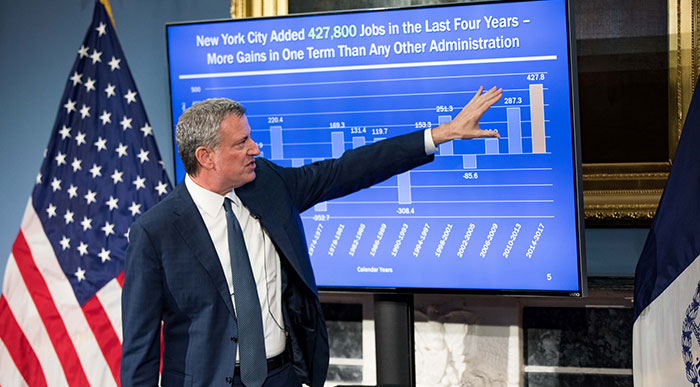Photo Courtesy of Benjamin Kanter/Mayoral Photography Office
In this year’s budget rollout, Mayor de Blasio also touted the current “strong” City economy.
By Michael V. Cusenza
As Mayor Bill de Blasio on Thursday delved into the details of the Executive Budget for Fiscal Year 2019 and he reiterated the ultimate goal of his second and final term—to make NYC the fairest big city in America—two observations became clear: said “fairness” apparently comes at a steep price; and someone’s got to pay for it.
Indeed, the $89.06 billion financial plan is $4 billion more than the FY 2018 Executive Budget, and a $7 billion increase from the FY 2017 proposal.
Hizzoner said the escalation is warranted.
“The goal that we bring to this entire second term, the next four years, is to make New York City the fairest big city in America. It is an organizing principle. It’s what we talk about as the idea that has to run through all of our decisions and our investments. So, you will see as I lay out this budget how that idea has played out,” the mayor said. “We ask ourselves a simple question: Is what we’re going to do something that will make New York City fairer? And that’s where we put our energy and our resources.”
According to de Blasio, the FY 2019 spending strategy makes “responsible investments” to fulfill his administration’s pledge to help make the Big Apple the fairest of them all and improve the lives of New Yorkers:
• Increasing the Fair Student Funding floor to 90 percent from 87 percent ($125 million);
• Deepening investments in cyber security to ensure the City’s systems are defended ($41 million);
• More than 3,000 permanent security barriers ($103 million in capital);
• Expanding the Equity and Excellence Universal Literacy programs so that all kids read on grade level by 3rd grade ($30.5 million);
• Creating a new, online parking permit system to enable better enforcement and curb placard abuse ($2 million);
• Providing a Mobile Trauma Response Unit in every borough to help disrupt violence in real time ($1.8 million);
• Supporting students in shelters by hiring more social workers ($12 million);
• Investing in workforce development by continuing the Career Pathways initiatives to connect New Yorkers with career opportunities ($7.1 million).
However, some critics say de Blasio’s fairness focus comes at the expense of many segments of the city’s population.
“We are extremely disappointed that in the $89 billion budget Mayor de Blasio unveiled Thursday there is no property tax relief to help seniors, retirees, working and middle class families who are struggling to make ends meet, as their taxes have skyrocketed and their incomes have stagnated,” City Councilmen Justin Brannan, Steven Matteo, Joseph Borelli, Paul Vallone, Barry Grodenchik, and Mark Gjonaj said in a statement. “We are all for making New York City more fair and that’s why we will continue to forcefully advocate for a property tax rebate throughout the budget negotiation process; homeowners in this city need property tax relief in a big way, and they need it now.”
Transit advocates were disappointed that the budget does not allocate funding for the Fair Fares program.
“The mayor is ignoring the needs of hundreds of thousands of his constituents and the recommendations of several dozens of elected officials, representing hundreds of diverse New York City neighborhoods, who are united for half-price MetroCards for low-income New Yorkers,” the Community Service Society and Riders Alliance said in a joint statement.

